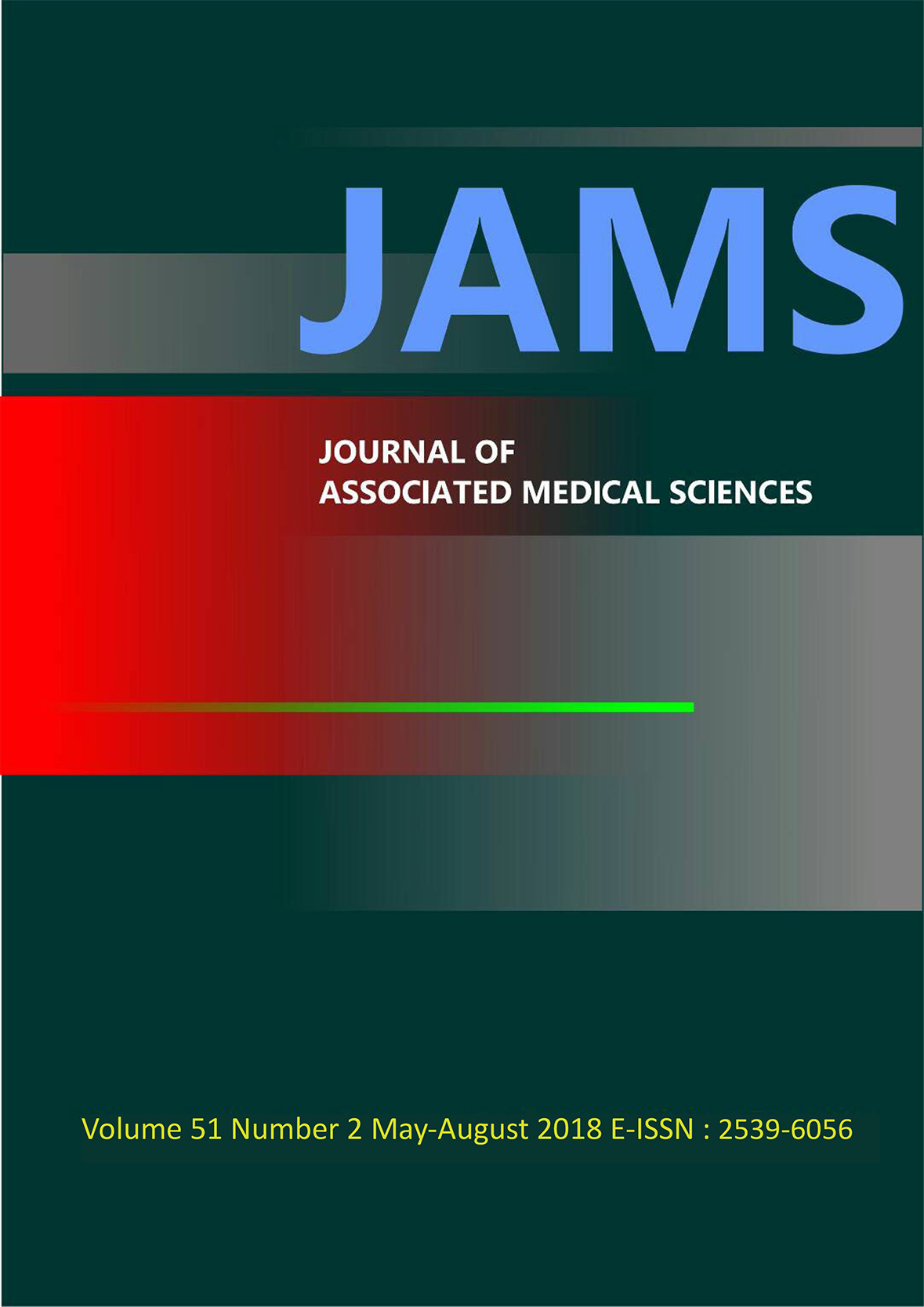Characterization of G6PD genotypes in G6PD deficiency patients from Suratthani Hospital, Thailand
Main Article Content
Abstract
Background: Glucose-6-phosphate dehydrogenase (G6PD) deficiency is highly prevalent in Southeast Asia especially in the area of malaria endemic regions. Primaquine is used for the radical treatment of malaria. However, it causes hemolytic anemia in G6PD deficient patients.
Objectives: To characterize G6PD mutations in G6PD deficient patients around Surat Thani province which is one of the malaria-endemic areas in Thailand.
Materials and methods: One hundred and seventeen leftovered EDTA blood samples were received from primary hospital in Surat Thani Province. All the samples were evaluated for their hematological profiles using an automated hematological analyzer (Beckman Coulter LH 780 Analyzer) and genotyped for G6PD variants using the DiaPlexC G6PD Genotyping Kit.
Results: G6PD mutations were identified in 117 cases of G6PD deficient cases. G6PD Viangchan (51.1%) was identified in 43 Thais and 4 Myanmars, G6PD Mahidol (30.5%) in 16 Thais and 12 Myanmars, G6PD Canton (7.6%) in 4 Thais, 2 Myanmars and 1 Laos, G6PD Kaiping and G6PD Union (4.3% each) in 4 Thais each, and G6PD Mediterranean (2.2%) in 2 Thais. However, the G6PD mutations could not be identified in the remaining 14 samples. There was no evidence of significant differences between hematological parameters among different groups of G6PD variants.
Conclusion: Our study revealed various distribution of G6PD variants in the region, raising the awareness about the requirement for optimal dosage of primaquine in the treatment of malaria infection based on data on G6PD variants.
Article Details

This work is licensed under a Creative Commons Attribution-NonCommercial-NoDerivatives 4.0 International License.
Personal views expressed by the contributors in their articles are not necessarily those of the Journal of Associated Medical Sciences, Faculty of Associated Medical Sciences, Chiang Mai University.
References
[2] Vulliamy T, Mason P, Luzzatto L. The molecular basis of glucose-6-phosphate dehydrogenase deficiency. Trends Genet. 1992; 8(4): 138-43.
[3] Persico MG, Viglietto G, Martini G, Toniolo D, Paonessa G, Moscatelli C, et al. Isolation of human glucose-6-phosphate dehydrogenase (G6PD) cDNA clones: primary structure of the protein and unusual 5’ non-coding region. Nucleic Acids Res. 1986; 14(6): 2511-22.
[4] Toncheva D, Tzoneva M. Prenatal selection and fetal development disturbances occurring in carriers of G6PD deficiency. Hum Genet. 1985; 69(1): 88.
[5] Peters AL, Van Noorden CJ. Glucose-6-phosphate dehydrogenase deficiency and malaria: cytochemical detection of heterozygous G6PD deficiency in women. J Histochem Cytochem. 2009; 57(11): 1003-11.
[6] Howes RE, Battle KE, Satyagraha AW, Baird JK, Hay SI. G6PD deficiency: global distribution, genetic variants and primaquine therapy. Adv Parasitol. 2013; 81: 133-201.
[7] Minucci A, Moradkhani K, Hwang MJ, Zuppi C, Giardina B, Capoluongo E. Glucose-6-phosphate dehydrogenase (G6PD) mutations database: review of the “old” and update of the new mutations. Blood Cells Mol Dis. 2012; 48(3): 154-65.
[8] Luzzatto L, Battistuzzi G. Glucose-6-phosphate dehydrogenase. Adv Hum Genet. 1985; 14: 217-329, 86-8.
[9] Phompradit P, Kuesap J, Chaijaroenkul W, Rueangweerayut R, Hongkaew Y, Yamnuan R, et al. Prevalence and distribution of glucose-6-phosphate dehydrogenase (G6PD) variants in Thai and Burmese populations in malaria endemic areas of Thailand. Malar J. 2011; 10: 368.
[10] Iwai K, Hirono A, Matsuoka H, Kawamoto F, Horie T, Lin K, et al. Distribution of glucose-6-phosphate dehydrogenase mutations in Southeast Asia. Hum Genet. 2001; 108(6): 445-9.
[11] Nuchprayoon I, Sanpavat S, Nuchprayoon S. Glucose-6-phosphate dehydrogenase (G6PD) mutations in Thailand: G6PD Viangchan (871G>A) is the most common deficiency variant in the Thai population. Hum Mutat. 2002; 19(2): 185.
[12] Laosombat V, Sattayasevana B, Janejindamai W, Viprakasit V, Shirakawa T, Nishiyama K, et al. Molecular heterogeneity of glucose-6-phosphate dehydrogenase (G6PD) variants in the south of Thailand and identification of a novel variant (G6PD Songklanagarind). Blood Cells Mol Dis. 2005; 34(2): 191-6.
[13] World Health Organization. Guidelines for the Treatment of Malaria 2015. Geneva: World Health Organization; 2015.
[14] World Health Organization. Testing for G6PD deficiency for safe use of primaquine in radical cure of P. vivax and P. ovale malaria. 2016 [cited 2017 July 1]. Available from: https://www.who.int/malaria/publications/atoz/g6pd-testing-pq-radical-cure-vivax/en/
[15] Bureau of Vector-Borne Diseases. Malaria reports. Department of Disease Control; 2015 [cited 2017 July 5]. Available from: https://www.thaivbd.org/n/histories/view/2584 (in Thai).
[16] Luzzatto L, Mehta A. In; Scriver C. R., Beaudet A. L., Sly W. S., Valle D. Eds. The Metabolic and Molecular Bases of Inherited Disease, 7th Ed, New York, McGraw-Hill Inc. 1995, pp 3367–98.
[17] Goo YK, Ji SY, Shin HI, Moon JH, Cho SH, Lee WJ, et al. First evaluation of glucose-6-phosphate dehydrogenase (G6PD) deficiency in vivax malaria endemic regions in the Republic of Korea. PloS one. 2014; 9(5): e97390.
[18] Glucose-6-phosphate dehydrogenase deficiency. WHO Working Group. Bulletin of the World Health Organization. 1989; 67(6): 601-11.
[19] Matsuoka H, Nguon C, Kanbe T, Jalloh A, Sato H, Yoshida S, et al. Glucose-6-phosphate dehydrogenase (G6PD) mutations in Cambodia: G6PD Viangchan (871G>A) is the most common variant in the Cambodian population. J Hum Genet. 2005; 50(9): 468-72.
[20] Ainoon O, Joyce J, Boo NY, Cheong SK, Zainal ZA, Hamidah NH. Glucose-6-phosphate dehydrogenase (G6PD) variants in Malaysian Chinese. Hum Mutat. 1999; 14(4): 352.
[21] Yusoff NM, Shirakawa T, Nishiyama K, Ghazali S, Ee CK, Orita A, et al. Molecular heterogeneity of glucose-6-phosphate dehydrogenase deficiency in Malays in Malaysia. Int J Hematol. 2002; 76(2): 149-52.


